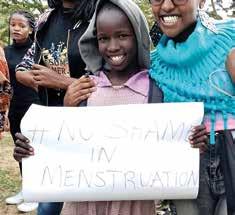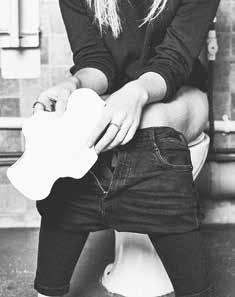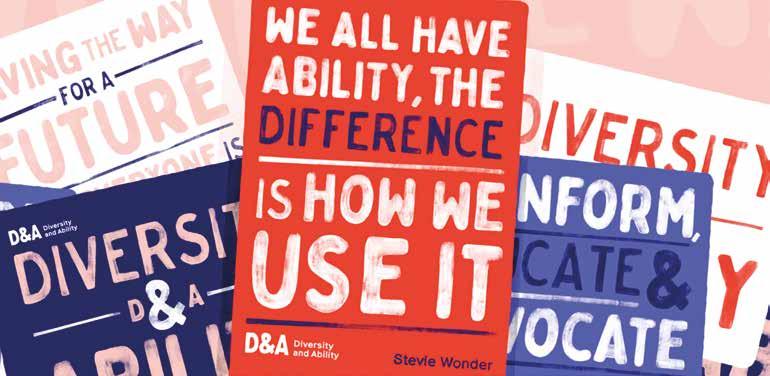
10 minute read
Fighting period poverty
PERIOD poverty affects millions of girls and women in the UK and across the world. One in ten girls in the UK are unable to afford period products, instead using rags, socks, toilet paper or newspaper, or just missing school altogether.
In fact, in 2018 a survey by the sanitary products brand, Always, found that 137,000 children in the UK missed school that year because they couldn’t afford period products.
Linda Allbutt is the founder of Period Power, an organisation providing free sanitary and other hygiene products to schools and charities in Staffordshire: “Once a month, girls are excluding themselves from school and their education. We’re losing massive potential because they can’t afford basic necessities.”
And the situation has only got worse since March this year. According to Plan International UK, three in ten girls have struggled to afford or access period products during the lockdown and, with a scarcity of toilet roll in shops and most schools and youth centres closed, many do not know where to turn.
“We’ve seen a huge increase in demands for help this year, a tenfold
increase. And those are the ones we know about,” says Linda.
More than four million children in the UK are currently living in poverty – a figure estimated to rise to five million by the end of this year. And it’s not just young people: 5.2 million women are currently living in poverty in the UK (compared with 4.7 million men). Menstruation is a biological process that women and girls can’t control, but period products are expensive and for many families, Linda says, “it’s a choice between buying food and buying period and hygiene products”.
Period dignity
The continuing stigma around periods and female health adds an additional barrier. Plan International found that 48 per cent of girls are embarrassed by their period.
Gigi Ermoyenous is a 16-year-old campaigner against period poverty. “When I first started talking about it in school the boys would freak out, go bright red and leave the room and a lot of girls are just too embarrassed,” she says.
Gigi convinced her school to set up Dignity Boxes – baskets of period products in every bathroom so girls could have free access to sanitary provision. “It’s the dignity side of it because it’s not just about being able to get them in school discreetly, it’s also being able to have enough to take home for the weekend.”
Gigi’s mum Jenny – who is also a campaigner and joint general secretary of Sandwell NEU – agrees: “The whole way periods are handled is yet another aspect of women being taught to be embarrassed about their bodies. Roughly half of society has periods but if you start mentioning it everyone gets embarrassed. If men had periods, the products would be free.”
Educators often to the rescue
Jenny also explains that it is usually educators who have borne the cost of period products in schools.
“Many educators I know purchase extra period products to carry around with them, in case their students need them. It’s just an additional cost on teachers – and some of them are financially struggling themselves,” she says.
Reusable products, such as menstrual cups, can help those who can’t afford to buy disposable tampons and sanitary products as they can be used over and over. However,
Dignity, safety and equality
Words by Emily Jenkins
Dignity, safety and equality
as they need to be cleaned to be reused, it requires regular access to good sanitation and clean water: something that many below the poverty line struggle to access.
At the age of 14, Gigi made a speech in Parliament against the Tampon Tax – the five per cent VAT that is applied to all tampons, sanitary pads and menstrual cups because they are categorised as ‘nonessential, luxury goods’.
“It’s the sexist inequality of it. Plus you can get free condoms, and in hospital men are given free razors and shaving foam, but until last year women in hospital weren’t being given free period products,” Gigi says.
It was only this March, after 20 years of campaigning by multiple women’s organisations and charities, that it was announced that as of 1 January 2021, the five per cent VAT will be scrapped. Organisations and charities have welcomed the change, but there’s still anger that it has taken so long.
Menstruation and the curriculum
The Government appears to be belatedly recognising some aspects of the importance of female health. In September menstruation was finally included on the relationships, sex and health education (RSHE) curriculum.
The guidance sets out that all pupils in primary school will learn about menstrual wellbeing and that menstruation should be covered, as much as possible, before onset.
However, the guidance isn’t completely clear, as Sally Thomas, NEU policy specialist for gender equality and child mental health, explains: “The guidance doesn’t give schools advice on when topics should be taught, or at what key stage, only that they should be covered by the end of primary or the end of secondary school.”
Heather McKenzie, chair of the NEU women’s organising forum, adds: “The NEU guidance sets the minimum expectation of what needs to be taught. It clarifies what should be covered in each key stage for all students and recognises that all girls need to be fully supported in primary schools, as some will start their periods well before going to secondary.”
A frightening time without education
Girls can start their period as young as eight years old and it can be a frightening thing to go through if you don’t know what is happening. According to a 2017 survey by betty education, nearly half of girls (44 per cent) felt unprepared and didn’t know what to expect when their period started.
“The NEU continues to lead and campaign for all members in schools and colleges to have input, access and training in menstrual health and other areas of the RSHE curriculum.
“We seek clearer advice, based on best practice, from Government. All students should learn about periods – to help build understanding and address stigma,” says Heather.
Gigi describes her own experience of sex education in school as less than adequate. “The first thing that annoyed me was the fact that they separated the girls and boys and showed us different videos and different things in different rooms. Boys need to know about this as well.”
Gigi feels strongly that the way periods are discussed fails to prepare young women for what they are about to experience: “You see this sanitised version of everything – like the adverts on TV not using red liquid but blue.
continued on page 29

continued from page 27
“And when adults do talk about it, they make it seem dainty and just a little bother, and you just need to put in a pad and it goes away; and it’s really annoying because it’s not like that.”
Not being allowed to go to the toilet
An additional barrier for girls is school policies that don’t allow pupils to leave the classroom to go to the toilet.
Plan International found that almost 70 per cent of girls in the UK aren’t allowed to use the toilet during lesson time, resulting in almost two thirds saying they’ve been worried about leaking in class when they have their period. And 16 per cent have decided to miss school because they were worried teachers wouldn’t allow them to use the toilet.
“A friend of mine asked to go to the toilet and the teacher said yes, but then he asked her why she was taking her bag with her. She had to explain in front of the whole class she was on her period,” says Gigi.
Sign up to Government scheme
The Government’s decision to catch up with Scotland and Wales – both already provide free period products in schools – is a welcome one. However, 60 per cent of schools and colleges are yet to sign up. Covid-19, of course, has been a factor in the lack of school uptake. But it also seems that many teachers aren’t aware that the scheme exists. For those who do try to access the scheme, the complicated registration process means many schools fail to complete it.
“I’ve spoken to a couple of teachers and the application is so onerous that they’re worried whether it’s worth it. It’s so infuriating that schools have to fill out yet more paperwork to receive something so important,” says Jenny.
According to the Government, the allocation is based on 35 per cent of pupils in a school who are likely to need period products; however, for many primary schools, the eventual amount of period products
NEU resources
The NEU has guidance on the new RSHE curriculum at neu.org.uk/ relationshipsand-sexeducation
The NEU endorses Agenda as an online tool to support young people’s mental health and wellbeing and help develop needs-led RSHE neu.org.uk/ agenda
provided doesn’t seem worth it. “We’re having to provide more to schools to cover the shortfall,” Linda explains.
The stigma around periods also means that many schools aren’t aware that some of their pupils – and even staff – may be struggling to afford products. “At first my school didn’t really believe me when I said there was a need. But I persuaded them there was and now they’re quite embarrassed they didn’t realise it was a problem,” says Gigi.
Despite the many issues around the scheme, campaigners are urging schools and colleges to sign up as soon as possible. The Government has suggested that the scheme is demand-led and spending will be reconsidered if there is not enough uptake.
As Sally Thomas explains: “No pupil should miss out on education because they can’t afford these essential products. We want all schools to take advantage of the scheme and urge the Government to do more to raise awareness in the sector. This scheme is more important than ever given the economic consequences of Covid-19 that will have pushed many more families into poverty.” n For more information and to register your school for the Government’s free sanitary products scheme visit bit.ly/33H1ozM n To help teachers, parents and students encourage schools to sign up, Free Periods and The Red Box Project are providing a toolkit of practical resources at freeperiods.org

Gigi Ermoyenous (above)
betty education
PSHE accredited free lessons for ages 8-12, which encourage open and respectful conversations about periods.
bettyeducation. com
The Hygiene
Bank Hygiene and personal care products for those who need them.
thehygienebank. com Bloody Good
Period Free period products for those who can’t afford them and menstrual education for those less likely to access it. bloody
goodperiod.com
Period Power
Staffordshire charity supplying period products to vulnerable women and girls. period
power.co.uk Freedom4Girls
UK charity campaigning against period poverty. freedom4
girls.co.uk


Period Poverty
Fighting UK period poverty and providing period products to shelters, refugees, unemployed, and women in low-income employment.
periodpoverty.uk Hey Girls
Eco-friendly Buy One Give One menstrual products, as well as education resources including information on talking about periods for boys and fathers.
heygirls.co.uk
Plan International
Global children’s charity.










